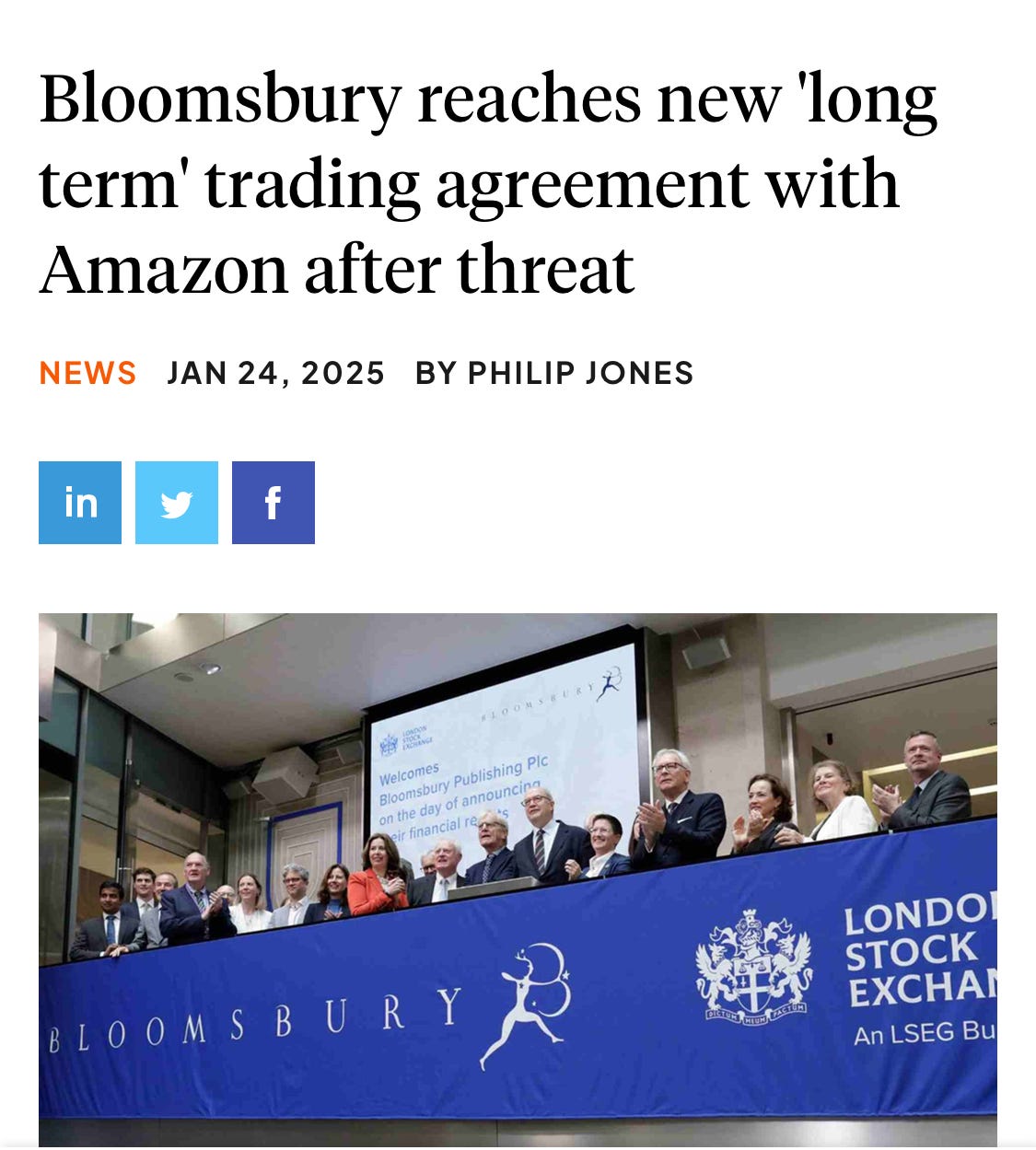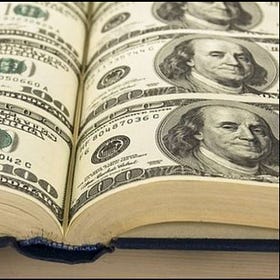The Time To Turn Away From Amazon is Long Overdue
We should have supported Bloomsbury this week
There was a flurry of activity in the What’s App groups that I belong to alongside other writers this week. Authors saying that they had sent panicked and nervous emails to their agent after the news late on Thursday night that Amazon had announced they would no longer be selling Bloomsbury books in the UK, Australia, Europe and indeed Kindle worldwide.
That would be quite a hit.
It is understandable perhaps that Bloomsbury authors would panic and email their agents — although I’m unsure what they would be able to do about it except send frantic emails to editors at Bloomsbury, piling pressure on them that would be passed up the chain.
I have published four books with Bloomsbury (my most successful, Sunday Times bestselling books), so I am a Bloomsbury author too, yet I did not feel panicked – I felt excited. Could this be the moment when the Amazon house of cards finally comes tumbling down? Would other mainstream publishers follow where Bloomsbury was daring to tread.
It was thrilling!
….and sadly, over within hours when Bloomsbury caved.
You see if you are a writer, it could be that Amazon is the reason that you’re careful with that thermostat of yours over winter, it could be the reason that you keep track of the cost of living crisis by the cost of fishfingers going up and up and up (or maybe that’s just me, £4.50 a packet now).
I don’t know the details of Bloomsbury’s contract with Amazon, of course, but I do know, like many publishers, they depend on Amazon sales, and that dependence puts all of us at a disadvantage and enables Amazon to set terms that – I would guess – are favourable to them (mostly), and less favourable to Bloomsbury (possibly), and even less favourable to authors (definitely).
And so could it be that Bloomsbury were trying to right that balance, and where authors should have got behind them, they were panicking that they might miss out on that few pence they get from every Amazon sale which basically made them the turkeys that were voting for Christmas.
I think I have told the story before of when I was running my own pop-up bookshop and a little schoolboy came in asking for a copy of the Guinness World Records. He was about 11, in an oversized blazer, and from the pocket inside of it he produced a plastic bag and started counting out his savings on the floor of my shop.
I didn’t have a copy of the book he wanted, but I said I could order it for him. He asked how much it would be and rather logging onto the wholesaler’s website, I just had a quick look at Amazon and realised that the book had been discounted perhaps 70%. I then went to my wholesaler’s website to see how much discount I got from them to buy it – 35%. So Amazon was selling it for far less than I could even buy it, and I looked at this little boy, counting out his pound coins on my shop floor, and told him I couldn’t take his money, that he would get it cheaper from Amazon. I just couldn’t do it. I told him if he was a grown up, someone who had made a decision to support an indie bookshop rather than Jeff Bezos, I could have done it, but not this kid. He said he didn’t mind, that he cared more about who could get it to him faster, and I had to admit… probably Amazon. He left, both of us disappointed, but that was the reality of book trading – you don’t stand a chance when you’re up against Amazon.
And of course I’ve seen it from the other side, right? As an author I get my royalty statements every six months and get lost in them because I am a words person and not a numbers one, but I can still see that it takes me years to earn out my advance if at all because all of those pennies need to add up. I’ve written before about what authors get paid here:
How Much Do Writers Actually Earn?
This week I received my royalty statement for Somebody I Used to Know, the first book that Wendy Mitchell and I wrote together.
And it didn’t used to be like this. Book retailers used to abide by the Net Book Agreement (NBA). The NBA was an agreement established among publishers at the turn of the last century, stating that if a retailer sold a book at less than the net price twelve months after publication, then all publishers would boycott that retailer. It was a gentleman’s agreement but vitally, it worked for writers. This agreement was abandoned in 1997. And guess which year Amazon started selling books in the UK? Yep, you’ve got it, 1998.
In other countries they still have this fixed book price (FBP) policy in place, and researchers at Cambridge took a closer look to see if it was advantageous to bookselling in those countries. Here’s what they found:
The research finds that countries with FBP policies see higher book sales relative to countries without such a policy, and with no noticeable effect on the average price of books. Given that book sales have generally declined over time, the findings are more precisely stated that FBP policies “result in book sales declining less than would be the case without such a policy”.1
So discounting books does not make books more valuable, authors richer, or make us buy more books – and yet authors, publishers and readers depend on Amazon. Help me make that make sense.
I stopped buying books from Amazon after I had my experience running a pop up bookshop because I want authors to have a fair return for their work more than I want to save myself a few pennies. I also found that I valued books more when I had decided to pay full price for them, I read them rather than just popping them on my shelf and forgetting about them. Perhaps you might find the same.
As a retailer, you cannot compete with Amazon for convenience, you can only hope that your customers make a decision to support you because if they don’t, one day there will be no bookshops to browse in. But I would go further, if they don’t, one day there will be no authors to write those books for them because they are being priced out of their trade, they are turning to other ways to make an income.
And I must mention that buying books from charity shops does nothing to help authors either, you are trading off their words and they are not receiving a penny for it.
Last week I got my PLR statement, that is Public Lending Rights, because, did you know, each time you borrow a book from a library, an author gets a couple of pence? It all adds up, last week my statement came in at almost £1,000 (can you IMAGINE what the bestsellers get!!). So if you want to read a book, get one from the library, and if you want to buy one support independent bookstores because if you don’t you will regret it.
And a plea to authors, next time your publisher tries to stand up to the behemoth, try sending a supportive email, rather than a panicked one. It might just serve you better.
I live in hope.
• I am one of the few still trying to pay my bills through writing books, and what helps me to do that is your support here. So if you are not a paid subscriber, please consider becoming one today as it means I can turn my thermostat up a couple of degrees, and buy fishfingers for my kid:








I’ve started re- selling my books to World of Books rather than give them to charity shops as they pay loyalties through the Author Share Scheme to authors registered with it. I’m assuming books donated to libraries will generate some income for authors too but I hope platforms like Substack will start to shift more power back to authors and independent booksellers as awareness is raised. More needs to be done though
I avoid Amazon as much as I can and don't buy books from them. My small town independent book seller is a gift to the community and there are so many others that we need to keep alive.